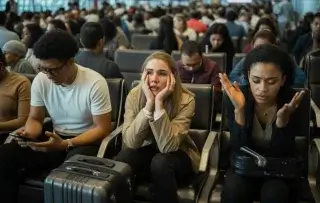read also
 Spring Break shifts toward private luxury villas: trend changes
Spring Break shifts toward private luxury villas: trend changes
 Albanian rents rise as investment returns fall
Albanian rents rise as investment returns fall
 Italy Raises Flat Tax to €300,000
Italy Raises Flat Tax to €300,000
 Storm Kristin Reprices Portugal Property Risk
Storm Kristin Reprices Portugal Property Risk
 London Heathrow Airport: 228 Delays and 48 Flight Cancellations
London Heathrow Airport: 228 Delays and 48 Flight Cancellations
 Batumi Housing Market: Prices Rose by 17% in 2025 — TBC Capital Report
Batumi Housing Market: Prices Rose by 17% in 2025 — TBC Capital Report
Travel Trends 2026 in Europe, the Middle East, and Africa: What Travelers Will Choose

Marriott Bonvoy has presented an updated picture of consumer behavior across the EMEA region (Europe, the Middle East, and Africa). The study covered more than 22,000 travelers from 11 countries and shows that 79% plan to travel the same amount or more in 2026 than in 2025. Digital assistants, “passion-based travel,” and hybrid multi-country itineraries are emerging as key trends.
Key Numbers at a Glance
- 79% of travelers plan to maintain or increase the number of trips in 2026.
- Around 50% have already used AI for travel planning or research; among Gen Z (18–24) the figure reaches 71%.
- 82% of Gen Z and 77% of millennials took at least one “passion pursuit” trip in the past year.
- 52% are ready to try country hopping, visiting several nations on one trip; among 25–34-year-olds, this rises to 66%.
- 73% consciously consider the environmental impact of travel; 32% assess sustainability before booking.
- Growing demand for solo travel (58%) and pet-friendly stays (47%).
- All-inclusive bookings are projected to rise to 45% in 2026.
AI Becomes a Standard Travel Tool
Half of all travelers have already used artificial intelligence to select destinations, hotels, and activities. Young travelers are leading the way — 71% of Gen Z use AI for vacation planning. This marks a shift toward trusting digital assistants to finalize bookings, not just generate ideas. For the market, it means more personalized recommendations, less decision time, and a seamless journey from inspiration to purchase.
Lux-scaping: Small Luxuries That Matter
The lux-scaping trend represents “micro-investments” in comfort before and after the trip — upgrades, lounge access, premium transfers, or spa rituals. It helps travelers maintain their budget while adding a touch of exclusivity. For hotels and airlines, it’s an opportunity for sustainable upselling without significantly increasing the trip’s total cost.
Passion Pursuits: Traveling for Experiences
This format builds travel around a specific passion — concerts, festivals, sports, exhibitions, or adventure. In the past year, 82% of Gen Z and 77% of millennials took at least one such trip. The most popular activities include:
- 47% — sports tournaments and races;
- 39% — adventure travel such as safaris or trekking.
Younger travelers are spending more on emotions and meaning, not just traditional “beach + sightseeing” vacations.
Country Hopping: Multi-Destination Adventures
The desire to see more in one trip is growing — 52% of respondents are ready to visit multiple countries on a single itinerary, and 66% among those aged 25–34. Supported by open visa policies, low-cost flights, and efficient transport links, country hopping is becoming a mainstream format across Europe, the Middle East, and Africa.
Sustainability and New Accommodation Preferences
73% of travelers take environmental impact into account, and 32% assess the “greenness” of their accommodation before booking. Parallel trends include:
- solo-friendly travel products (58% demand),
- pet-friendly stays (47%) as part of the modern lifestyle.
For the industry, this is a call to increase transparency, adopt measurable eco-standards, and communicate sustainable practices clearly.
All-Inclusive Makes a Comeback
By 2026, 45% of bookings are expected to be all-inclusive. The reason is simple — travelers value predictability and convenience: fixed budgets, fewer decisions on-site, and ready-made packages combining relaxation and entertainment.
What It Means for the Travel Industry
- Personalization by default: AI-driven modular travel packages will define the market.
- Monetizing the journey’s edges: Lux-scaping creates steady upselling opportunities.
- Events as new seasons: Cultural and sports calendars will smooth out seasonal demand.
- Connectivity over geography: Country hopping thrives where logistics are seamless.
- Sustainability as a competitive edge: Transparent eco-practices and lifestyle options drive loyalty.
- Comfort without surprises: The growth of all-inclusive reflects the value of simplicity.
Methodology
The data is based on a survey of over 22,000 travelers across 11 EMEA countries. Some indicators represent expectations for 2026, focusing on behavioral intentions rather than confirmed bookings.
Conclusion
Travel in 2026 across Europe, the Middle East, and Africa will be more technological, flexible, and meaningful. AI will shape trip planning, “passion pursuits” will drive new travel motivations, and multi-country itineraries will redefine how people experience the world. The winners will be the brands and destinations that combine personalization, sustainability, and a seamless customer journey.
Подсказки: travel, tourism, AI, Marriott Bonvoy, Europe, Middle East, Africa, sustainable travel, travel trends, 2026, Gen Z, passion pursuits, country hopping, lux-scaping, all inclusive


